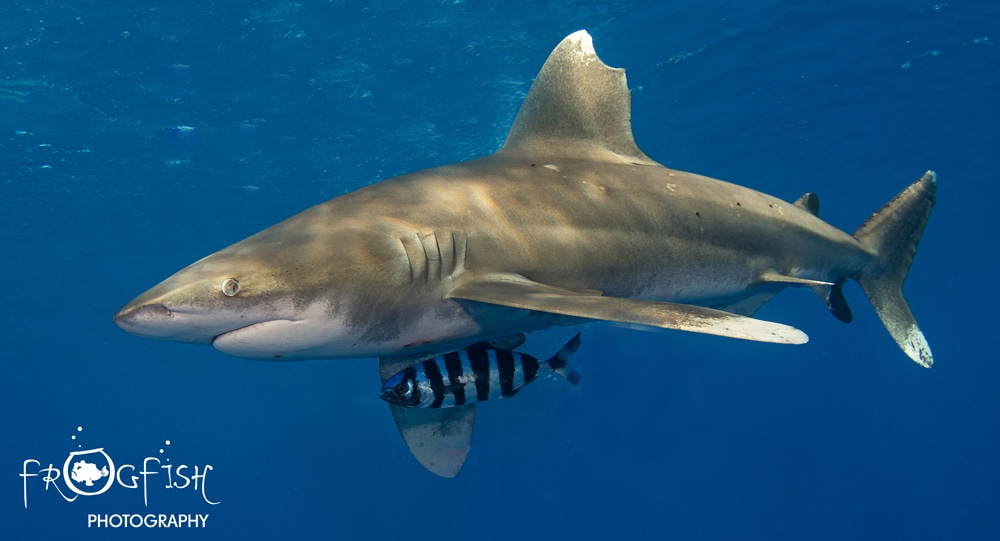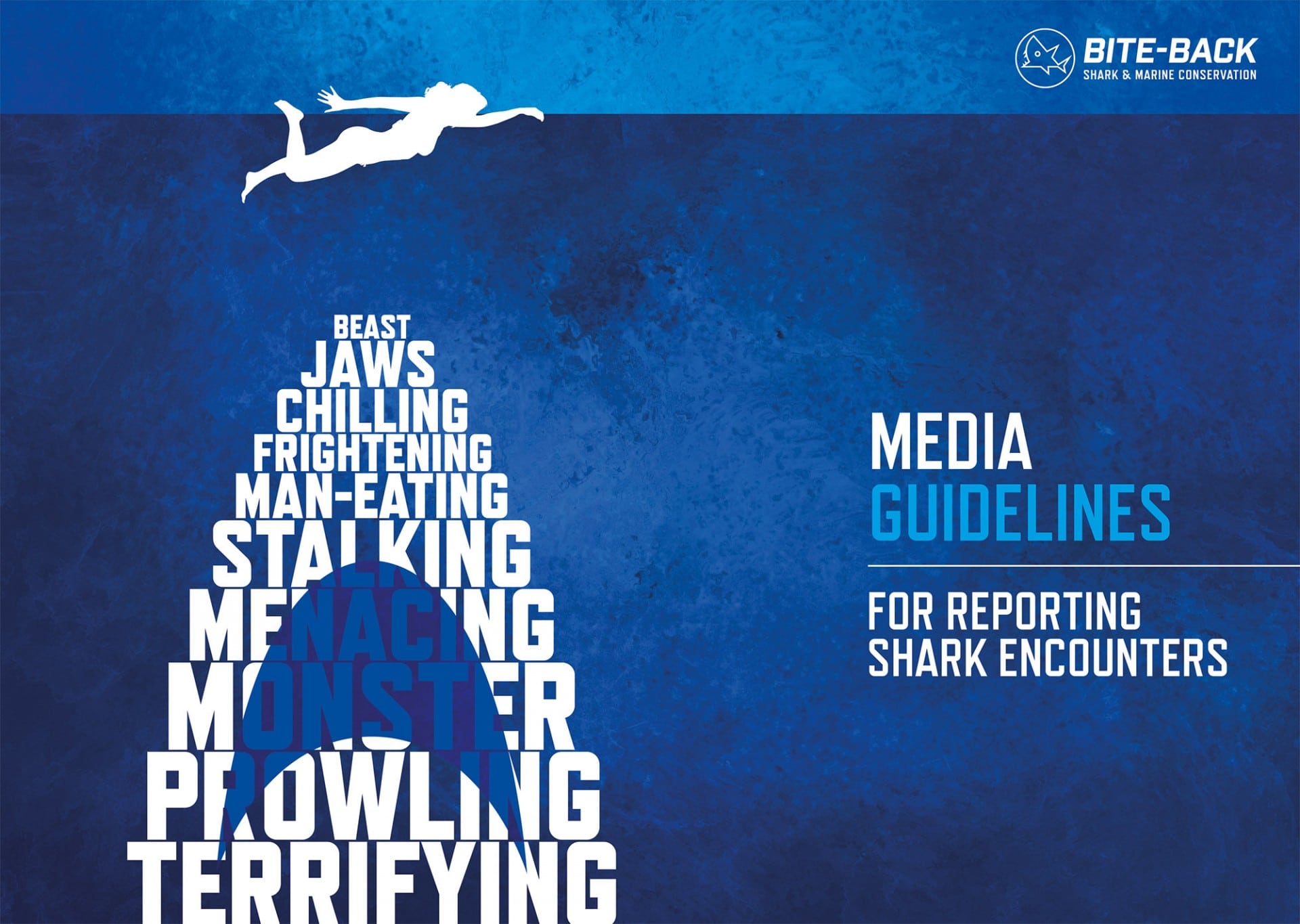Marine Life & Conservation
Mind your Language: TV Presenters back Bite-Back’s call for responsible shark journalism

TV presenters Steve Backshall and Hugh Fearnley-Whittingstall head a growing list of high profile individuals supporting a call for responsible shark journalism by Bite-Back Shark & Marine Conservation.
The UK charity says that decades of news headlines labelling sharks as ‘monsters’, ‘killers’ and ‘beasts’ — language typically used to describe rapists, terrorists and paedophiles — has created a climate of fear and loathing that is thwarting shark conservation initiatives.
Bite-Back’s view is underpinned by a recent survey that revealed 46% of Brits think that sharks are terrifying than spiders, snakes and rodents combined and that 64% would prefer them not to exist.
TV presenter and patron of Bite-Back Shark & Marine Conservation, Steve Backshall, said: “It’s time that journalists understand how these sensational headlines and falsehoods are perpetrating a hatred of sharks that justifies their boundless slaughter. As such, I think the media is complicit in one of the greatest deliberate exterminations in our planet’s history.”

An estimated 73 million sharks are slaughtered every year and Britain ranks in the top 25 shark fishing nations in the world. As a result, populations of key shark species including the great white, hammerhead, oceanic whitetip and thresher have fallen by 90% in the past 60 years.
Chef and campaigner Hugh Fearnley-Whittingstall said: “Sharks are getting a bad press they simply don’t deserve. Decades of sensational headlines have stripped sharks of their status as vital marine species and all too often left the public frightened for little reason. I’d welcome any move by the media to fairly report sharks rather than default to tired and inaccurate click bait captions.”
In the past six weeks most UK print, online and broadcast media outlets have run shark stories from around the world and closer to home. Many have used language including ‘ferocious’, ‘terrifying’, ‘killer’, ‘invasion’, ‘blood-thirsty’, ‘lurking’ and ‘deadly’ to describe sharks despite the fact that typically only six people a year worldwide die from shark encounters, whereas dogs kill around 25,000. On average British cows kills more people each year than all the sharks in the world.
Bite-Back has also achieved support for this appeal from ocean ambassador Wendy Benchley, widow of Peter Benchley the author of JAWS. She said: “While the cinema is a place of entertainment, newspapers and media channels are a place for facts. For far too long the news press have blurred the boundaries between fact and fiction and got away with reporting sharks as man-eating monsters when it’s simply not true. I believe this constant portrayal of sharks as the bad guys rather than our ocean heroes is hindering shark conservation efforts.”
In a bid to make Britain the first western country to ban shark product by 2022, Bite-Back has successfully campaigned for ASDA, Iceland Foods and MAKRO to end the sale of shark steaks. It has also spearheaded an 82% fall in the number of UK restaurants selling shark fin soup and prompted Holland & Barrett to end the sale of shark cartilage capsules.
 Campaign director for Bite-Back Shark & Marine Conservation, Graham Buckingham, says: “No other creature on this planet is described with inflammatory language intended to spread fear, panic and hate. As a result, the mere presence of a shark in the sea prompts sensational, attention-grabbing headlines. We’re keen to work with the press and reach a point where shark encounters are reported accurately and fairly and in a way that doesn’t jeopardise our blue planet.”
Campaign director for Bite-Back Shark & Marine Conservation, Graham Buckingham, says: “No other creature on this planet is described with inflammatory language intended to spread fear, panic and hate. As a result, the mere presence of a shark in the sea prompts sensational, attention-grabbing headlines. We’re keen to work with the press and reach a point where shark encounters are reported accurately and fairly and in a way that doesn’t jeopardise our blue planet.”
The charity now plans to present its 15 page media guideline document on best practice for reporting shark encounters to all the major news channels in the UK.
Read more about shark conservation issues visit www.bite-back.com
Marine Life & Conservation
Paul Watson Released as Denmark Blocks Japan’s Extradition Bid

Renowned anti-whaling activist Paul Watson has been released from custody in Greenland after spending five months in detention. Denmark’s Justice Ministry rejected Japan’s request for his extradition, citing insufficient guarantees that his time already served in custody would be credited against any potential sentence.
The 74-year-old Canadian-American was arrested on July 21 in Nuuk, Greenland’s capital, when his ship docked to refuel. His arrest was based on a 2012 Japanese warrant related to a 2010 encounter in Antarctic waters. Japan alleged Watson obstructed operations and caused damage to a whaling research ship during efforts to disrupt illegal whaling. Watson has consistently denied these claims, maintaining his commitment to marine conservation.
Denmark, which oversees extradition matters for Greenland, concluded that while the legal conditions for extradition were met, the lack of assurances from Japan regarding time-served credit made extradition untenable.
In a video shared by his foundation, Watson expressed gratitude and relief, saying, “After five months, it’s good to be out… and good to know they’re not sending me to Japan.” He added that the most difficult part of his time in custody was being separated from his two young sons.
Watson is a pioneering figure in marine conservation, known for founding the Captain Paul Watson Foundation in 2022 after decades of activism with the Sea Shepherd Conservation Society. His bold efforts to defend marine life have earned him widespread support, including from celebrities and conservationists. His work has also been featured in the acclaimed reality TV series Whale Wars.
Watson’s lawyer, Jonas Christoffersen, praised the decision, stating, “We are happy and relieved that Paul Watson is now free.” He added that Watson is eager to reunite with his family and continue his vital work.
The arrest occurred while Watson’s vessel, the M/Y John Paul DeJoria, was en route to the North Pacific with a team of 26 volunteers to intercept a Japanese whaling ship. His foundation described the arrest as politically motivated and emphasized that Watson’s actions were focused on ending illegal whaling practices.
Japan resumed commercial whaling in 2019 after leaving the International Whaling Commission, asserting that whale meat is a cultural tradition. Conservationists, however, continue to challenge these practices, highlighting their impact on marine ecosystems.
Despite the challenges, Watson remains steadfast in his mission to protect marine life and bring attention to whaling practices. His dedication to ocean conservation has made him a globally respected advocate for the environment.
Marine Life & Conservation
12 Days of Zero-Waste Fish-mas

This holiday period, the Marine Conservation Society, the UK’s leading ocean membership charity, invites you to make some simple changes to eating fish this Christmas to help our seas.
Dr Kenneth Bodles, Head of Fisheries and Aquaculture at the Marine Conservation Society, said, “During the festive season, our consumption increases, but so does waste. Sustainability isn’t just about where food comes from – it’s also about how you use it. By reducing waste and making the most out of your seafood, you’re not only taking steps to be more ocean-friendly, but can also help to cut costs during what is often one of the most expensive times of the year”.
The Marine Conservation Society has compiled twelve tips on how to consume seafood sustainably with zero-waste this Christmas:
Buy whole fish instead of fillets
Instead of fillets, consider buying whole fish such as salmon, hake, or lemon sole. By adopting a “nose to tail” approach with cooking, whole-baked fish not only feeds a crowd, but also helps to minimise waste and maximise sustainability by using up every part of the animal, including bones, skin, and fat.
Make fish stock
Leftover fish bones or shells can be put to good use by boiling them to make a nourishing fish stock or bisque. This can be frozen and preserved for later use and makes for a flavourful base in a soup.
Make your own fish pâté
Avoid waste by turning leftover fish, such as smoked mackerel or salmon, into a delicious pâté by blending with cream cheese and lemon. Perfect when paired with crackers.
The sustainability of salmon and mackerel varies depending on where and how it is caught or farmed. For more information on green-rated options, check the charity’s Good Fish Guide.
Buy frozen
By purchasing seafood that is frozen or vacuum-packed, this helps to reduce waste by extending the shelf life of your food.
Fish pie
If you’re wondering what to do with leftover cooked fish, why not opt for a classic fish pie with mashed potatoes, leeks, and a cheesy sauce? A sure crowd pleaser on Boxing Day.
Use the head
Don’t forget the fish head! The meat is incredibly tender and flavourful. The charity recommends a cod’s head curry or recreating Fallow’s renowned cod’s head in siracha butter.
By stretching your ingredients further, not only is this a more sustainable way to enjoy seafood, but also cost-effective by repurposing leftovers and cooking creatively.
Boxing Day brunch
Mix leftover kippers or smoked salmon with scrambled eggs for a tasty, zero-waste, Boxing Day brunch.
For best choice, make sure you buy kippers, or herring, from the North Sea and the North Irish Sea.
Zero-waste storage
A top tip from the Marine Conservation Society to avoid waste is freezing fish offcuts to save for future use.
Crisp up the skin
Even leftover fish skin can be turned into a quick savoury snack by crisping it up in an air fryer with a little olive oil and salt.
Anchovies two ways
Leftover anchovies can either be blended with butter to make a delicious anchovy butter or tossed into pasta for a hit of umami flavour.
The charity recommends opting for anchovies caught in the Bay of Biscay for best choice.
Fishcakes
For an easy, zero-waste meal, leftover seafood trimmings can be mixed with mash and fried in breadcrumbs to make fishcakes.
Pickled mussels
Try pickling mussels in 1:1 vinegar and water, with a dash of sugar for a sustainable, zero-waste snack that can be enjoyed well beyond the festive season.
Mussels farmed in the UK are a seafood superhero. Grown using low-impact methods and harvested by hand, they get all the food they need from the sea around them. This makes them one of the most sustainable, ocean-friendly, and cost-effective seafood options.
Players of People’s Postcode Lottery have raised £6.6M towards the Marine Conservation Society’s vital work in making seafood more sustainable.
Laura Chow, Head of Charities at People’s Postcode Lottery, said: “Fish is a festive favourite for many, but making sustainable choices when it comes to how we buy and eat seafood makes all the difference for our ocean. Support from players of People’s Postcode Lottery has helped the Marine Conservation Society further its sustainable seafood work, so that we can all enjoy healthier, better protected seas.”
The Marine Conservation Society encourages you to make sustainable seafood choices a year-round habit, not just for Christmas. To check how sustainable the seafood on your plate is, you can visit the charity’s Good Fish Guide. The Guide helps consumers and businesses identify the most sustainable seafood using a simple traffic light system, based on where and how species are caught or farmed. Green is the best choice, amber means improvements are needed, and red indicates fish to avoid buying.
Zero-waste gift idea
Why not embrace a zero-waste Christmas by gifting a membership to support marine conservation? It’s a meaningful, low-waste gift that helps protect our ocean for generations to come. Memberships start from as little as £5 a month – the price of a sandwich and drink from your local coffee shop.
Find the latest sustainable seafood advice for wild-caught and farmed seafood on the Good Fish Guide, downloadable to your phone from www.mcsuk.org/goodfishguide.
-

 News2 months ago
News2 months agoIconic SS United States to become the World’s Largest Artificial Reef
-

 News3 months ago
News3 months agoBook Review – 52 Assignments: Underwater Photography
-

 Gear News3 months ago
Gear News3 months agoDYNAMICNORD – New German diving brand enters the British market
-

 News3 months ago
News3 months agoExploring Cenote El Pit: A Diver’s Dream
-

 Gear News3 months ago
Gear News3 months agoTry BARE drysuits (and maybe even win one!) this Friday with Sea & Sea at North West Dive Fest
-

 Marine Life & Conservation3 months ago
Marine Life & Conservation3 months agoBook Review: Coral Triangle Cameos
-

 Blogs2 months ago
Blogs2 months agoDive the Egyptian Red Sea this Autumn with Regaldive
-

 News3 months ago
News3 months ago2024 Ocean Art Underwater Photo Competition Announced



